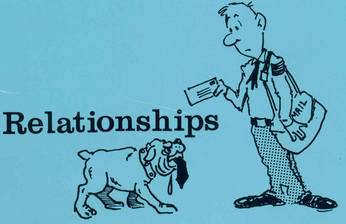Introduction
Tools for Relationships
By: James J. Messina Ph.D.
|
|
|
The goal of Tools for Relationships
In the next fifteen chapters you will be exploring issues which are barriers to healthy interpersonal relationships. You will be exposed to new beliefs, new behaviors, and new procedures to strengthen, clarify, and heal hurting relationships. You will be given a series of lessons on what are ``normal'' behaviors necessary to make strong healthy adult to adult relationships.
It is not important or necessary for you to accept the term dysfunctional family to describe your family of origin if you are in need of the material in this book. If you currently are dissatisfied with the way you and others relate to one another, then this book can help you. If you and a significant other, engaged partner, or spouse are in counseling then these tools can help you both to accelerate the pace of insight development and behavioral change in the psychotherapeutic process.
What is important in using the tools in this book is to recognize that in order for relationships to become healthy you must first become healthy yourself. You may need to work on the tools for personal growth, handling loss, improving communications, and changing old behavioral scripts in the other Tools for Coping Series books before you tackle the tools in this book. It is usually prudent to allow the significant others in your life to become aware of your use of the tools in this book so as to give them a chance to use them too. If both parties in a relationship are committed to joint use of these tools, following the “Steps to” sections in each chapter and faithful daily journal writing then they will have established a process of relationship building, strengthening and healing.
In the next fifteen chapters you will be exploring issues which are barriers to healthy interpersonal relationships. You will be exposed to new beliefs, new behaviors, and new procedures to strengthen, clarify, and heal hurting relationships. You will be given a series of lessons on what are ``normal'' behaviors necessary to make strong healthy adult to adult relationships It is not important or necessary for you to accept the term dysfunctional family to describe your family of origin if you are in need of the material in this book. If you currently are dissatisfied with the way you and others relate to one another, then this book can help you. If you and a significant other, engaged partner, or spouse are in counseling then these tools can help you both to accelerate the pace of insight development and behavioral change in the psychotherapeutic process.
|
Prologue to Tools for Relationships
I am a solid wall, a steel barrier blocking you from the opportunity to have meaningful relationships with your family, friends, employees, coworkers, and your fellow man. I was constructed brick by brick, stone by stone with the sheer power of the unwillingness to communicate, the hatred, prejudice, stubbornness, jealousy, denial, anger, inability to listen, lack of understanding, selfishness, mistrust, fear, insecurity, inflexibility, lack of respect, avoidance, a need for power and irrational fantasies learned in childhood.
Do yourself a favor. Break me down. Destroy me with the sledgehammer of truth, love, compassion, trust, open mindedness, intelligence, understanding, communication, respect, acceptance, foresight, sympathy, and reality. Crumble me into dust so that I can never again be built between you and the rest of the world. Stamp out my entire existence so that I can never again interfere with you and your relationships.
Word from the Author
Over my career I have written a number of articles related to self-esteem. In 1992 Kendall Hunt Publishers published 9 books which were a summary of the articles which I had written related to self-esteem. In this section we will focus on the fifth of the Tools for Coping Series all of which were published in 1992. The book is Tools for Relationships.
I place Tools for Relationships on www.coping.org in 1999 to make the free and accessible to all people who were looking for such tools to help strengthen and heal their relaitonships. Some of the chapters were tranferred to www.livestrong.com in January 2009 as a result of my selling coping.org to Design Media. What follows here on Coping.us are the original order of the chapters from the 1992 version with major editing revisions to update and modify the materials to make them more relevant to our current readers.
Jim
August 8, 2011
|
|
|
